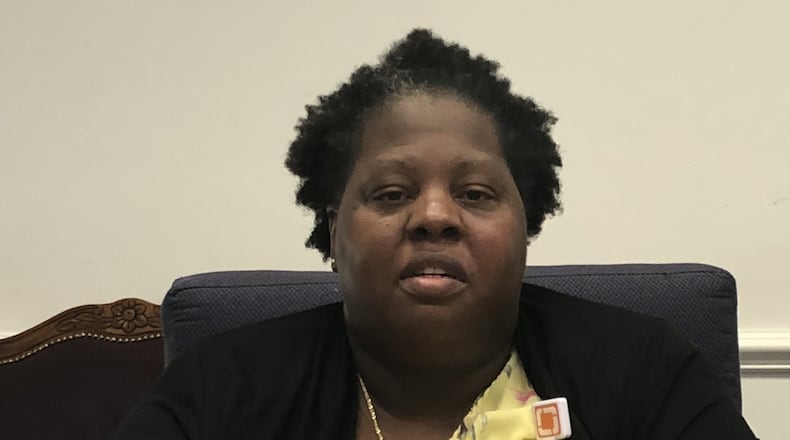A mother whose family’s hard times led to her sons’ removal from school says she’s only fighting with the Henry County school district for their futures.
The district dis-enrolled her two boys after learning they don't live in Henry County. But the family doesn't have a lease or a mortgage on a place of their own. Their plight illustrates the complexity of a problem that is increasingly common among Georgia public school students: homelessness.
In an exclusive interview with the AJC, Jacopa Johnson said a dispute with their landlord last year led to their eviction. Ten days from Christmas, that took their lives in a direction they never anticipated.
“We’d been paying the rent, but he wanted us to make repairs that we didn’t feel was our place to pay,” said Johnson. “We had to leave that day.”
The family packed up their belongings in a U-Haul truck and moved into a motel.
“My husband was recently disabled and he wasn’t working,” said Johnson. In taking care of her husband and the children, Johnson lost her job. Trained in the nursing field, she’d begun looking for something permanent. The eviction made that more difficult.
After two weeks their funds ran out, and the Johnsons moved with their two school-age boys to stay with relatives: her sister, her mother, his father. They couch-surfed until they settled semi-permanently with Johnson’s father-in-law in Macon.
To keep some stability in their tumultuous lives, the parents decided to drive an hour every morning to keep the boys in the same school they’d been attending.
According to a law called the McKinney-Vento Act, homeless students are allowed to stay in their original school. The law requires districts to try to reduce student mobility (moving from school to school) by keeping a homeless student in his original school unless the student or a parent or guardian requests a transfer.
A 2014 report by the Governor’s Office of Student Achievement in Georgia found schools with higher concentrations of mobile students had higher percentages of students with disabilities and fewer students in gifted education programs.
Although Johnson let the school know that their status had changed, she didn’t seek any social services and turned down school transportation. She was assigned a liaison to help her as a parent of homeless students, but she said the process was confusing and she wasn’t informed in plain language what her rights and responsibilities were.
“I received a few emails, but never met with the liaison until July,” Johnson said. “They never discussed what was best for my children.”
Although Henry County officials refused to comment for this story, they said the homeless liaison has regularly passed yearly audits.
The boys, identified in court documents as K.J. and C.S., 9 and 17, pretty much stayed off the district’s radar until it came time to enroll for the next school year.
Because the older son is in line to graduate this year and the younger son has special needs, Johnson used the address of a friend to establish residency for the boys. Based on that address, however, the younger son had to move to another school in the county.
Johnson appealed that school assignment. The district says that is what led it to investigate further, and determine that, based on residency regulations, Johnson’s sons weren’t eligible for enrollment in Henry County Schools.
The district says it had notified the parents on May 31 that the boys’ no longer meet the federal definition of homelessness.
It removed them from their schools on Aug. 17.
A lawsuit filed for the family last month against Henry County Schools contends that the district used the wrong definition of homelessness when it did that.
The U.S. Department of Education and the U.S. Department of Housing and Urban Development look at the issue of homelessness from different perspectives.
The definition of homelessness used by all U.S. public schools includes children and youth who lack a “fixed, regular and adequate nighttime residence.” This definition specifically includes children and youth living in shelters, transitional housing, cars, campgrounds, motels and sharing the housing of others temporarily due to loss of housing, economic hardship or similar reasons.
With few exceptions, the HUD definition of homelessness only includes people living in shelters, transitional housing or on the streets or other outdoor locations.
The Johnsons’ situation underscores what Barbara Duffield, executive director of SchoolHouse Connection, a national advocacy organization on the early care and education of children and youth experiencing homelessness, said is a common misconception.
“Many people don’t understand that homelessness isn’t always youth or a family standing on a corner or living in their car,” she said. “There aren’t many family shelters and there’s a stigma of fear and shame associated with homelessness.”
She added that the HUD definition was meant to identify homeless adults.
“Confusing the two definitions can be dangerous for families,” she said. “Having a roof over your head isn’t the same as the stability and safety of having your own place with your own roots.” Living in overcrowded conditions with strangers or even with family can put children in danger of abuse or neglect.
A judge ordered the Johnson boys returned to classes in Henry, and gave the sides a month to work it out.
Federal guidelines were put in place in 1987 with the McKinney-Vento Act to remove barriers to homeless students’ success, said Eric McGhee, grants program manager for the state Department of Education. “Every district has a written policy for dispute resolution,” he added without commenting specifically on the Henry County case. “When there are red flags, the district will conduct an investigation.
“It’s very rare that this gets to the level of a judge or even the state intervening,” said McGhee. “The process works.”
The number of homeless students has grown steadily over the years. Preliminary figures show that 2018-2019 will be the first time it tops 40,000 in Georgia. Henry County alone has gone from 724 homeless students in 2013-2014 to 1,177 in 2017-2018, according to state education department data.
Eugene Choi, a lawyer with the Georgia Legal Services Program who is representing Johnson, said it may take longer than the month the judge gave to work out details of an arrangement.
Johnson isn’t waiting for the courts to take care of her family, however. She started a new job Monday — in Conyers, which isn’t far from Henry County.
“I’m saving up and trying to get us back on our feet. I’m looking into someplace affordable in Henry County so there will be no question that my sons belong in their schools,” she said. “My only mission right now is them. That’s what parents do — they take care of their children no matter what.”
About the Author
The Latest
Featured



